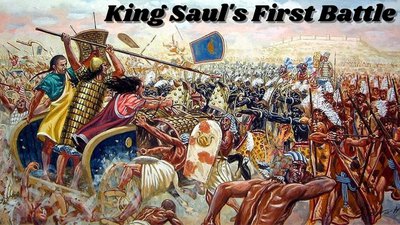Thoughts for the Day
Wednesday, 17th July 2024: Samuel: 14
Judge 1 Samuel 11 King Saul Samuel Prophet
Reading : Verses from 1 Samuel, Chapter 11

About a month later, Nahash the Ammonite went up and besieged Jabesh-gilead; and all the men of Jabesh said to Nahash, ‘Make a treaty with us, and we will serve you.’ But Nahash the Ammonite said to them, ‘On this condition I will make a treaty with you, namely that I gouge out everyone’s right eye, and thus put disgrace upon all Israel.’ ..... When the messengers came to Gibeah of Saul, they reported the matter in the hearing of the people; and all the people wept aloud.
Now Saul was coming from the field behind the oxen; and Saul said, ‘What is the matter with the people, that they are weeping?’ So they told him the message from the inhabitants of Jabesh. And the spirit of God came upon Saul in power when he heard these words, and his anger was greatly kindled. He took a yoke of oxen, and cut them in pieces and sent them throughout all the territory of Israel by messengers, saying, ‘Whoever does not come out after Saul and Samuel, so shall it be done to his oxen!’ Then the dread of the Lord fell upon the people, and they came out as one.... They said to the messengers who had come, ‘Thus shall you say to the inhabitants of Jabesh-gilead: “Tomorrow, by the time the sun is hot, you shall have deliverance.”’ When the messengers came and told the inhabitants of Jabesh, they rejoiced.... The next day Saul put the people in three companies. At the morning watch they came into the camp and cut down the Ammonites until the heat of the day; and those who survived were scattered, so that no two of them were left together.
The people said to Samuel, ‘Who is it that said, “Shall Saul reign over us?” Give them to us so that we may put them to death.’ But Saul said, ‘No one shall be put to death this day, for today the Lord has brought deliverance to Israel.’
Samuel said to the people, ‘Come, let us go to Gilgal and there renew the kingship.’ So all the people went to Gilgal, and there they made Saul king before the Lord in Gilgal. There they sacrificed offerings of well-being before the Lord, and there Saul and all the Israelites rejoiced greatly.
(Lectionary, New Revised Standard Version)
Thoughts
The Ammonites were distantly related to the Israelites, but were a cruel and aggressive people and frequently harassed the tribes that lived east of the river Jordan (see 'Map of the area' under 'Further Thoughts'). In this case they have surrounded the town of Jabesh-Gilead and given their men a terrible ultimatum of removing their right eye, which would ensure they were unable to fight effectively, but worse still it would make them 'unclean'. It was a way of humiliating all Israel, at a time when they were weak. 'Nahash' means `snake' - reminiscent of the devil in the Garden of Eden, perhaps?
At this point let us stop and consider what is wrong with the Israelite's attitude. Instead of humbling themselves before God and confessing their sin they set Him on one side and offered to become servants of the Ammonites and their gods. The arrival of the messengers from Jabesh-Gilead in Gibeah terrifies the whole town, for this could shortly be their fate too. But Saul sees this as the message from God that he has been waiting for, and we are told that 'the Spirit of God came upon him'. His plan is clever, he threatens the people's livelihood, their oxen, if they don't turn out to support him as King, and Samuel as their Prophet. So the nation comes together and subsequently defeats the Ammonites. Saul has proved himself a worthy King. Those voices who doubted him have been quashed, and Samuel brings the whole nation together at Gilgal to reaffirm the King and his Kingdom.
There is a lesson for us to learn from this incident. When the cause is right and the need desperate it is wrong to do nothing. In our world doing nothing allows a dictator to continue; doing nothing allows the weak to suffer even more. Righteous anger is always on behalf of another person, as with Saul's anger, and not for selfish reasons.
Prayer
Heavenly Father,
when the cause is right
may we not pass by on the
other side,
but support and uphold
all who are in danger.
May we fight for what is right
in any way that is suitable,,
knowing that Your Son
has taught us to stand up
for the weak, the dispossessed,
the poor and the sick.
Help us to never to give up
but always to turn to You first.
Amen.
You might like to look at this map showing the whole area, including Jabesh-Gilead, Mizpah, and Gilgal. Note, the map is a later one, so Jerusalem as such doesn't exist and has another name at this time, but it is helpful to see its position:
Or this: